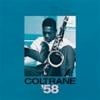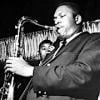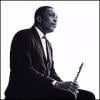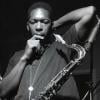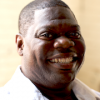
Born into jazz royalty, Grammy nominated tenor saxophonist, bandleader, producer, and composer Ravi Coltrane has led an amazing and unusual life. The son of famed saxophonist John Coltrane and pianist Alice Coltrane, Ravi was just two when he lost his celebrated father to liver cancer. Raised by his mother in a house full of music and deep spirituality, his personal and professional journey to creatively and uniquely express himself reflects her strong and positive influence on him, as well as the musical legacy of both his parents that he is strongly committed to preserving.
In support of that intention, for the first time, Coltrane is presenting a show at SFJAZZ dedicated exclusively to exploring the music of John and Alice Coltrane on Nov. 4–7. In a show titled “Cosmic Music,” his quintet will feature a mix of young performers — Gadi Lehavi on piano and San Francisco native Elé Howell on drums, along with bass player Lonnie Plaxico and guitarist David Gilmore, both of whom Coltrane has played with many times over the years. Please note that the Friday, Nov. 5 concert will be livestreamed as part of SFJAZZ's Fridays Live series.
What made you decide to do a program dedicated to the music of both your parents?

Getting older I guess, and sometimes you have to embrace your roots. And it’s not anything I try to hide from — it’s music that I love, and it moves so many people in the world. Most musicians of this era were so inspired and moved by the music of both John and Alice, so this is a just more formal presentation of their music.
You were raised by your mother who was very musical and also very spiritual. How did that affect you?
My mother raised me and was the number-one influence in my life. She was so unique and such a guide. She never remarried and was firmly focused on raising her kids. In everything she did, she was seeking the highest perfection that the human experience can achieve. I have always admired her for how focused she was on her natural gifts and her dedication, and I have tried to bring the same focus to my music. She was in a very proactive spiritual life and existence —there is a very spiritual quality to making music for me.
You made just one album with your mother in 2004 called Translinear Light. What was that experience like?
It was the experience of a lifetime. I am more proud of that project than anything else that I have been involved in. I produced the album, and in many ways it was the catalyst that got my mother back in the studio. She did not record for about 25 years — she had moved much more into a spiritual practice and purpose. I would come home from the road and let her know that there were so many Alice Coltrane fans around the world who were constantly asking me, “When is your mother going to record again?” But she felt very comfortable in her post-music career and life and wasn’t really that willing to go back. But I begged and I pleaded, and I am happy she agreed to make that album — we lost her a few years later.
You are chairman of The Coltrane Home, an organization dedicated to the preservation of your parents’ home on Long Island. What motivates you to do that?
I think it was a calling. I am very proud of the family that I was born into and to be a custodian of the legacies of John and Alice, so I try to maintain it and help it grow. And I hope that someday my kids will also heed that calling. The home is just the symbol of what John and Alice left for us, but it’s also the home where I spent the first six years of my life. A lot of beautiful things happened in that home, so preserving it for future generations is something I am compelled to be a part of.
Are your two sons, Aaron and William, musical?
Yes, and they are both very talented. My youngest was recently accepted into the precollege program at Manhattan School of Music. He’s playing classical piano and is very dedicated to his music. My oldest son started off playing piano when he was six, but there’s something about the early teenage years — they end up moving in other directions. He was a very talented jazz pianist and then he got into electronic music.
You made your most recent album [with Ralph Alessi], Imaginary Friends in 2019. Any plans to make a new album?
The record industry has changed so much in the last decade, so I don’t see the same sort of urgency in putting out records each year. But I do recognize the importance of making albums and I hope to release something soon.

What was your experience during COVID-19, when you couldn’t perform and what did you learn from it?
It just completely stopped what we were doing. I’ve been on the road since 1991, and once you’re on the road, it’s hard to stop and turn things off. I think for most of us, it allowed us to slow down and assess who we are and what our roles truly are in this world as creative people.
It was also a good time for transformation. It allowed us to shift in directions we might not otherwise have shifted, and it showed me that I should never take any opportunities or music for granted.
What inspires you to be on the road all the time performing?
It does feel like work at times, but we’re here to express ourselves musically and creatively and the audience is there to receive it. It’s a beautiful union between the musicians on the stage and the listeners in the audience, and it’s been a joy to re-embrace that connection.


